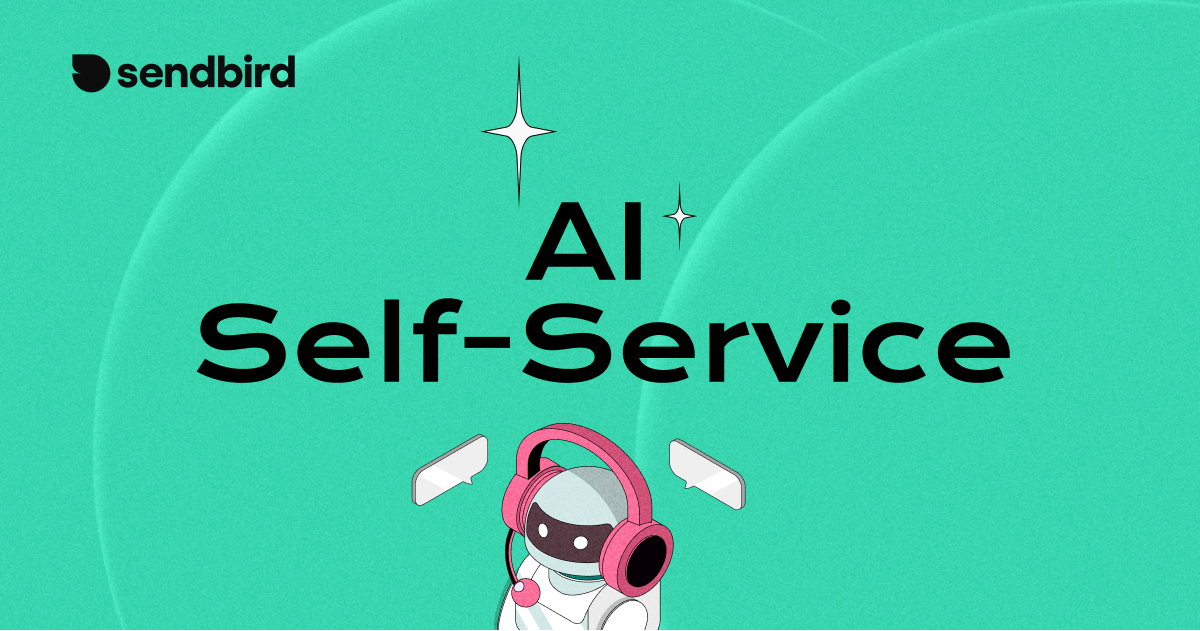AI Self-Service: Definition & FAQs

What is AI Self-Service?
AI self-service, powered by innovative technologies like chatbot API, is a transformative approach integrating artificial intelligence into user-centric systems.
These systems aim to empower users with seamless access to information, task execution, and transactions, all achieved autonomously without human intervention. In the expansive realm of AI self-service applications, including chatbots, virtual agents, voice recognition, and machine learning algorithms, businesses leverage advanced tools to enhance customer experiences.
At the forefront of AI self-service, chatbots, fueled by the capabilities of chatbot API, emerge as dynamic virtual agents simulating human conversation. Employing natural language processing and machine learning algorithms, these chatbots adeptly understand and respond to user queries. The integration of AI-powered chatbots enables businesses to deliver instant support and assistance, elevating customer satisfaction while minimizing reliance on human intervention.
Read the introductory guide: What is an AI chatbot?
The impact of AI self-service extends beyond immediate customer interactions. It revolutionizes business-customer dynamics by providing a cost-effective and scalable solution for round-the-clock support. AI-powered self-service systems not only enhance the overall customer experience but also contribute to increased operational efficiency. Businesses can derive valuable insights from user interactions, shaping strategic decisions and improving service delivery. As technology advances, the role of chatbot API in AI self-service is set to grow, presenting businesses across diverse industries with new opportunities for innovation and customer engagement.
Benefits of Implementing AI in Self Service Systems
The integration of AI in self-service systems, powered by sophisticated technologies like a Chatbot API, brings a plethora of advantages for both businesses and users.
From a business standpoint, AI self-service becomes a cost-effective solution, significantly reducing the reliance on human agents. Utilizing a Chatbot API, AI-powered chatbots and virtual agents empower organizations to efficiently handle a higher volume of customer inquiries simultaneously, thereby enhancing operational efficiency and curtailing labor costs.
Beyond cost savings, AI self-service ensures round-the-clock availability, offering users seamless access to information and support at any time. This 24/7 accessibility eliminates the need to wait for business hours or navigate intricate IVR menus, contributing to heightened customer satisfaction.
For users, AI self-service epitomizes convenience and autonomy. Rather than navigating complex menus or reaching out to customer service agents, users can simply pose questions or state their needs, and the AI-powered self-service system, with the prowess of Chatbot API, promptly furnishes relevant and accurate information. This user-centric approach empowers individuals to find answers and resolve issues independently, mitigating frustration and saving valuable time.
Read about the big picture: How to use AI in customer experience.
A pivotal advantage of AI in self service platforms lies in its capacity to provide personalized assistance, further enhanced by the capabilities of Chatbot API. AI algorithms, utilizing Chatbot API for dynamic interactions, leverage user data and preferences to offer tailored recommendations and solutions. For instance, frequent buyers may receive relevant offers and promotions, enhancing their overall experience.
Moreover, AI self-service systems continually evolve and improve through machine learning algorithms, including those facilitated by Chatbot API. These systems analyze user interactions and feedback, refining responses and providing more accurate information over time. This iterative learning process, driven by Chatbot API, ensures the self-service system becomes increasingly adept at addressing user queries and concerns.
Lastly, the implementation of AI in self-service platforms yields valuable insights and analytics, a process optimized by Chatbot API. By scrutinizing user interactions and data, businesses gain a profound understanding of customer preferences, pain points, and trends. These insights, harnessed through Chatbot API, inform decision-making processes, enabling organizations to optimize products, services, and the overall customer experience. In essence, the strategic integration of AI and Chatbot API in self-service systems represents a forward-thinking approach, revolutionizing the dynamics of customer engagement and business operations.
AI Self-Service: Improving Efficiency and Reducing Costs
In today's fast-paced and technology-driven world, businesses are constantly seeking ways to improve efficiency and reduce costs. One such solution that has gained significant traction is AI self-service. This innovative approach not only offers a range of benefits but also transforms the self-service landscape.
One of the key advantages of AI self-service is its ability to automate repetitive and low-value tasks. These tasks, which often consume a significant amount of time and resources, can now be handled effortlessly by AI-powered systems. By taking over these mundane tasks, AI self-service frees up human agents to focus on more complex and high-value interactions. This not only increases agent productivity but also enhances the quality of customer service by allowing human agents to dedicate their attention to more critical issues.
Imagine a scenario where a customer interacts with an AI self-service system. The system, equipped with natural language processing capabilities, understands the customer's query and provides accurate and relevant information. Not only that, but it also personalizes the interaction based on the customer's past preferences and behavior. This level of personalization creates a seamless and tailored experience for the customer, increasing satisfaction and loyalty.
In conclusion, AI self-service is revolutionizing the way users access information and complete tasks. By enhancing the user experience, improving efficiency, and reducing costs, AI self-service systems are becoming an indispensable tool for businesses across various industries. With their ability to automate tasks, provide valuable insights, understand natural language, and continuously learn, these systems are paving the way for a future where self-service is seamless, personalized, and efficient. Embracing AI self-service is not just a competitive advantage; it is a necessity in today's digital landscape.
To learn more about AI self-service, check our the complete guide to AI chatbots: What is an AI chatbot?
Examples of AI Self Service
- Retail Industry: Imagine a customer browsing an online retail store and encountering a product they're interested in. With AI-powered self-service, the customer can initiate a chat with a virtual assistant to inquire about product details, availability, or shipping information—all without human intervention. Retailers like Amazon and Sephora have implemented AI chatbots to enhance the shopping experience and provide instant assistance to customers.
- Banking Sector: In the banking sector, AI self-service solutions are revolutionizing customer support and account management. Customers can now check their account balances, transfer funds, or even apply for loans through automated chatbots available on banking websites or mobile apps. Examples include Bank of America's virtual assistant, Erica, and Capital One's Eno, which offer personalized financial insights and assistance 24/7.
- Hospitality Industry: Hotels and travel agencies are leveraging AI self-service to streamline booking processes, handle reservation modifications, and address customer inquiries efficiently. For instance, Marriott International's AI-powered chatbot, ChatBotlr, assists guests with booking accommodations, accessing hotel amenities, and providing local recommendations—all through natural language conversations.
How to build your own AI service?
If you’ve found yourself asking: Can I create my own ChatGPT chatbot on mobile or website? You can, easily, with Sendbird’s ChatGPT capabilities.
With the introduction of ChatGPT-powered chatbots by Sendbird, businesses can now engage state-of-the-art technology to build custom ChatGPT chatbots that revolutionize the customer experience.
GPT AI takes chatbot interactions to a new level with human-like and personalized interactions. The experience improves user engagement and satisfaction, which drive applications' top-line revenue growth. In addition, cloud-based automation boosts operational efficiency with 24/7, scalable, and global availability.
With Sendbird's new ChatGPT integration and chatbot API and chatbot UI, you can now build your own ChatGPT chatbot in minutes.
Anyone can do so with zero coding experience in the dashboard, and developers with just a few lines of code using the Chatbot API of Sendbird's platform. If you need to embed ChatGPT chat in your app, build a quick proof of concept to get used to our simple chat APIs.
Once ready to turn on the ChatGPT chatter in your app, start a 30-day free trial. Now go have fun building a chatbot with ChatGPT! 🤖 💬










